When Piranha Bytes released the original Gothic back in late 2001 here in North America, the era of open world CRPGs had just been kicked off by Bethesda’s Elder Scrolls: Morrowind, and Gothic found itself lost in the hype that game generated. Though full of new ideas and even a few re-worked and improved upon old ones, Gothic had an unwieldy control system and clunky animations; remnants of its original status as an Xbox title meant for play on an under-powered console and controlled by a gamepad.
Regardless, Gothic found its niche with older gamers who appreciated the Ultima 7 inspired NPC interaction, the creative faction play, and the feeling of hopelessness that permeated both the game’s story and its lopsided combat difficulty. It harkened back to a time when CRPGs didn’t set out to make the player feel like a golden god and instead did everything in its power to humiliate and frighten the player as well as the main hero that you controlled.
Unfortunately, time wasn’t kind to Gothic or Pirahna Bytes, since every game they’ve made after 2003 has been (perhaps unfairly) compared to their earlier successes. The passionate cultists that had been worshiping Piranha Bytes since 2001 wanted another Gothic 1 or 2, and they simply wouldn’t accept anything less. Fans wanted the unforgiving combat, the deep faction play, the highly non-linear questing, and the dark atmosphere to return, and no compromises were expected. Of course, when the majority of the team that was responsible for the game their new work is compared to are no longer present at the company, you probably shouldn’t act surprised when the attempt to recapture that old magic fizzles like a waterlogged 4th of July sparkler.
So imagine my shock when I played Elex and had to check the desktop icon to make sure I didn’t accidentally load Gothic 2: Night of the Raven by mistake.
Elex
Publisher: THQ Nordic
Developer: Piranha Bytes
Platform: PC (Reviewed), PlayStation 4, Xbox One
Release Date: October 17th, 2017
Players: Single Player
Price: $49.99
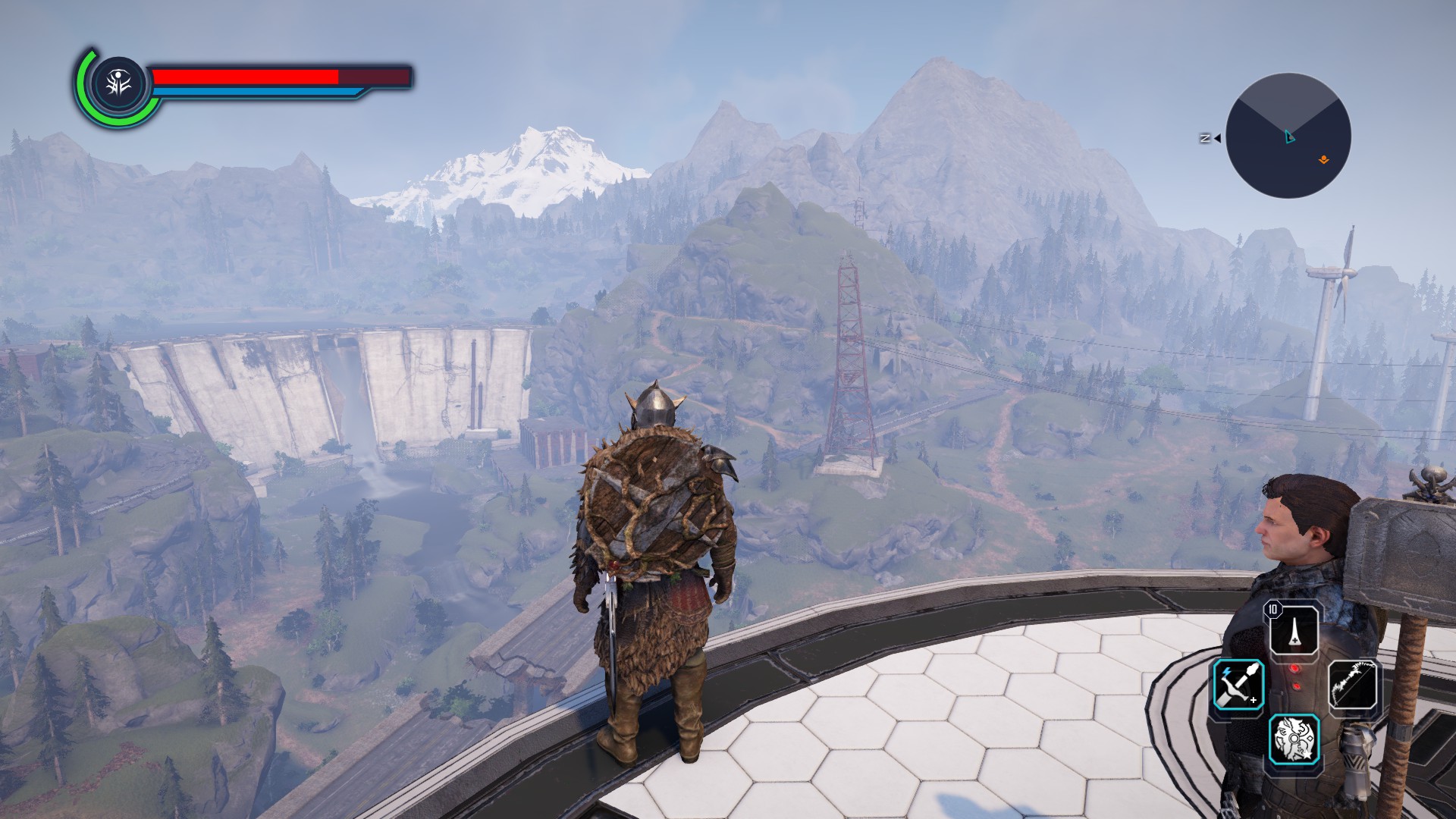
Funny joke, right? Here’s something even more hard to swallow: In many ways, Elex is even better than Gothic. Not perfect, of course, but so remarkably close to the perfection that is Gothic 2 that the only way you could hit the target any cleaner would be to do a byte-for-byte HD remake of the original game.
Elex is obviously meant to be enjoyed by the fanatic nutcases (like myself) who still play the first two Gothic games and hold them up as sterling examples of CRPG perfection. I say this because nearly every feature that Gothic is known for not only returns here in Elex, but is made slightly deeper.
Though combat, world exploration, and atmosphere play big parts in Piranha Bytes’ old formula for CRPG success, it was the faction play and quest dynamics that really made the Gothic series stand out.
Each of the three factions you could join (And there were always three) had their own quest lines, would get their own unique responses from NPCs, and gave opportunities to slightly alter the story depending on who you aligned yourself with. Whether it was getting closer to discovering the secret behind the last boss by shacking up with the weed-smoking swamp camp or learning more about the magical power of the ore by placating the water mages of the new camp, there was always some facet of the story that would change or become revealed depending on who you chose to befriend. It also made conversing with members of rival factions more entertaining, since they would distrust you if you weren’t one of them.
Unlike Morrowind, which had a very cardboard-like faction system where people either attacked you on site or wanted to rub up against you, Gothic was more subtle and usually kept rival NPC interaction in a much more nuanced “middle ground”.
Elex does the same, but only this time, broadens the non-linearity by giving nearly every single quest, regardless of importance, multiple ways to complete it.
Out of all the things that impressed me about Elex, it was the extreme non-linearity and depth of the faction politics and the quests that backed them up which pleased me the most. Just about every quest from every faction gives you opportunities to backstab, lie, or go back on promises given.
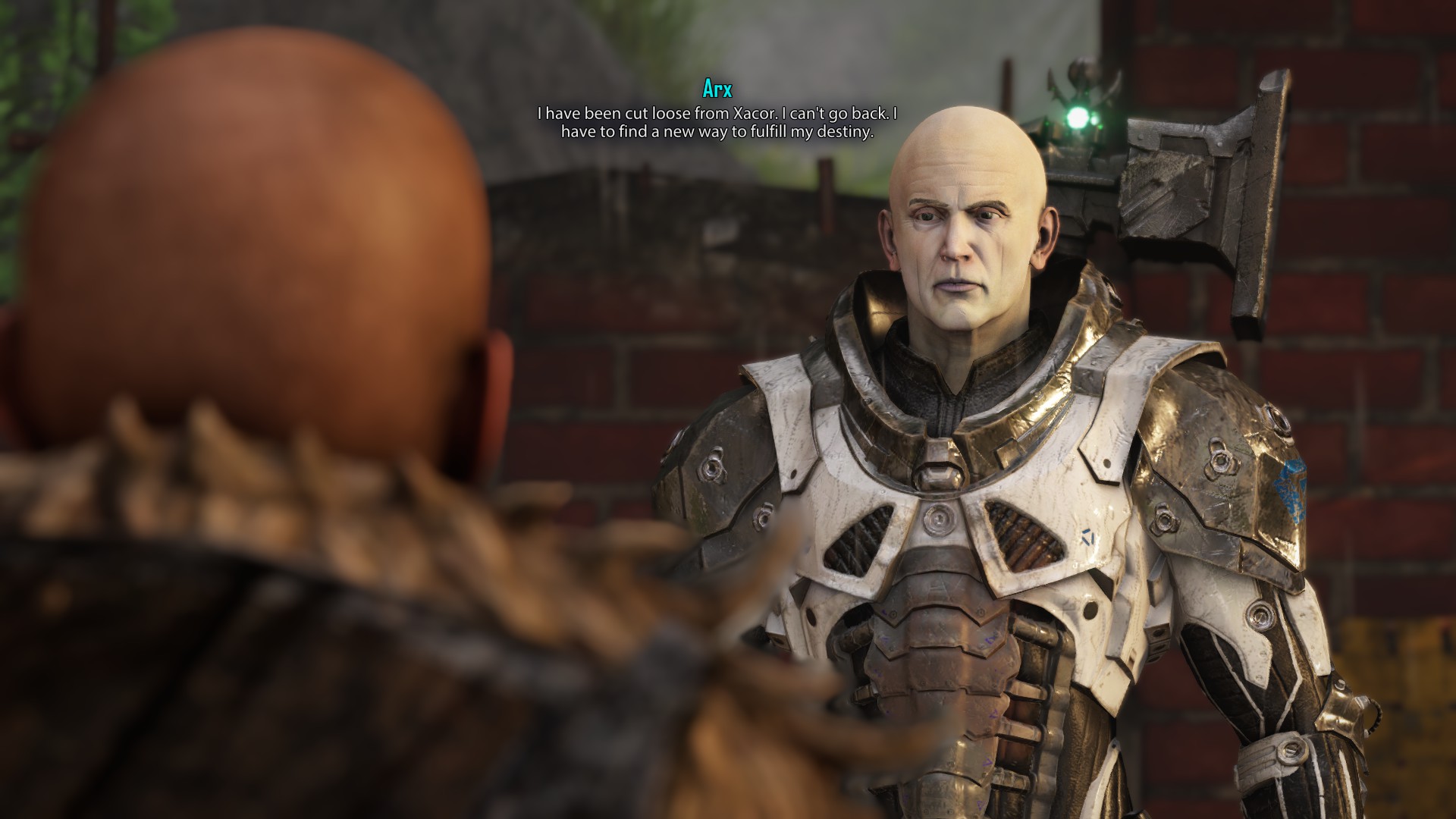
Did an NPC tell you to frame someone else for their crime and you planned on doing so but after meeting the would-be patsy you feel sorry for them? Then double-cross the thief and set him up. Or maybe you want to please your faction leader and gain reputation by ratting them out. Or maybe you go through with the scheme and set them up, only to realize that later in the game you get reprimanded when people discover you lied and you not only lose reputation, but get locked out of a new quest line which would have been there if the NPC you framed (or even killed) was still around.
There was also a point in the story where I found a group of alb separatists, and had a chance to kill them or report them to my faction leader. I thought I did the “right thing” by helping them and telling another faction that they needed protection…unfortunately that faction ended up killing them later in the story and a certain other faction leader blamed me for their deaths, which locked me out of having a potential ally.
Quests like this are surprisingly frequent in Elex. Most missions have multiple solutions and choosing one over the other can even influence your karma stat (referred to in-game as “Cold”), which in turn is checked in dialogs to determine what responses you can make.
I was shocked at how many times during a quest you can change allegiances and play one side against another. A good example is the quest in Abessa where the outlaws are making fake ID badges to get into the Cleric’s domed city. There are at least 4 times during that short, mostly dialog-based quest where you can play one NPC against another and sell one or more out. Most quests have diverging pathways like this, and the game even pops up and warns you on whether the NPC will tell others what you did or remember your action. The non-linearity and faction play is – and I know this may seem hyperbolic – the best I’ve seen in a Piranha Bytes game, period.
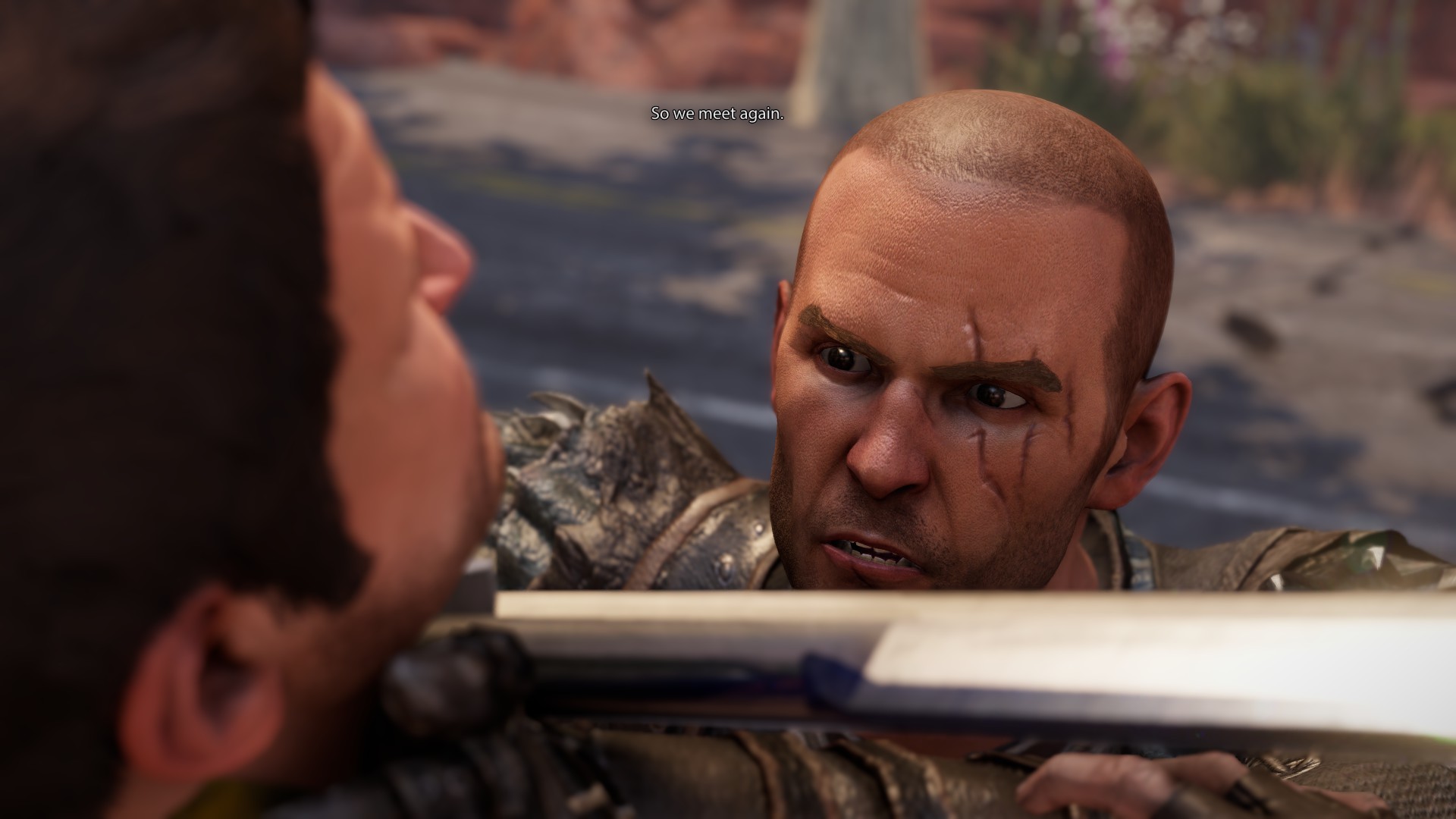
CRPG grognards love chanting the mantra of “choice and consequence” in their games, and other than Witcher 3, I don’t know of any title released in the past few years that exhibits the kind of non-linear gameplay that Elex comes with. (outside of indie CRPGs like Age of Decadence, at least) With the main game being a 80 hour trip and so many different pathways and endings to see along that journey, it’s not lying to call Elex a 300+ hour game. If they were trying to improve on Gothic’s faction play and quest dynamics, they triumphantly succeeded here.
It also helps that your skills, just like your karma (“Cold”) directly affect dialog too. Having a high point investment in the “Crafting” skill tree often opens up technical solutions to problems, such as being able to complete quests in a non-combat way by informing the quest giver on how to fix their problem without the need for assistance. The same can be done with your points in the combat tree, since if they are high enough, dialog options to intimidate people will appear. It’s very much like New Vegas in its execution, and that’s a bold but fair comparison to make.
As good as Piranha Bytes has been with creating non-linear storylines, one thing they have had trouble with is their combat engines. Oh sure, the hardcore crowd enjoys the challenge of their often times awkward (and sometimes downright unplayable) battle systems, but learning how to win a fight usually meant discovering how to get enemies stuck in polygons or timing attacks to exploit gaps in your opponent’s animations.
These methods wouldn’t be so annoying if Piranha Bytes’ games didn’t have this sneaky little way of putting you in situations where victory is statistically impossible. In Gothic 2 it was making you fight a high level guard at Onar’s farm that will one-hit-kill you unless you get him stuck on a wooden pillar and peck at him with crossbow bolts for 15 minutes. In Elex, it’s asking your naked, newbie self to take on 5 heavily armored Alb soldiers all using flamethrowers and laser rifles.
Same difference, really.
…but here’s where I feel Elex surpasses Gothic. Unlike the tricks we’d employ to win in that game, Elex has a depth to its combat that is more about knowledge and less about trickery. Its depth is only evident when you explore the tools the game gives you.
Take the aforementioned battle with the five alb soldiers, for instance. How did my level four, naked, poorly armed and exceedingly weak hero win that fight? I lured them all out in the open, flew straight up into the air with my jetpack, then when they were tightly packed a couple hundred feet below me, I hovered above them and dropped grenades on top of their heads.
What resulted was a thick black cloud of displaced dirt and black smoke that, when finally cleared, revealed five dead bodies to loot.
Now, I had no skill points put into the grenade skill, but the power they had when thrown from above and in a tightly packed mob of enemies was something that made me rethink how I should be playing the game.
From that point on I began playing with and mixing up the game’s many attack options. I discovered the extremely overpowered nature of fire magic, which would ignite any enemy near someone who you’ve already lit up. I realized how powerful the multi-shot arrow skill was when you shoot at point blank range, allowing all 4 projectiles to hit the enemy at once. I marveled at how strong a shield bash can be when employed on a single large target, since your companion NPC can essentially lock them into a continual death spiral as you bash them to the ground leaving them prone. In short, combat is hard – at first – but once you learn the tricks, it becomes highly addictive and makes you feel like you’ve accomplished something once you nail that large group of soldiers or high level raptors with your clever tactics.
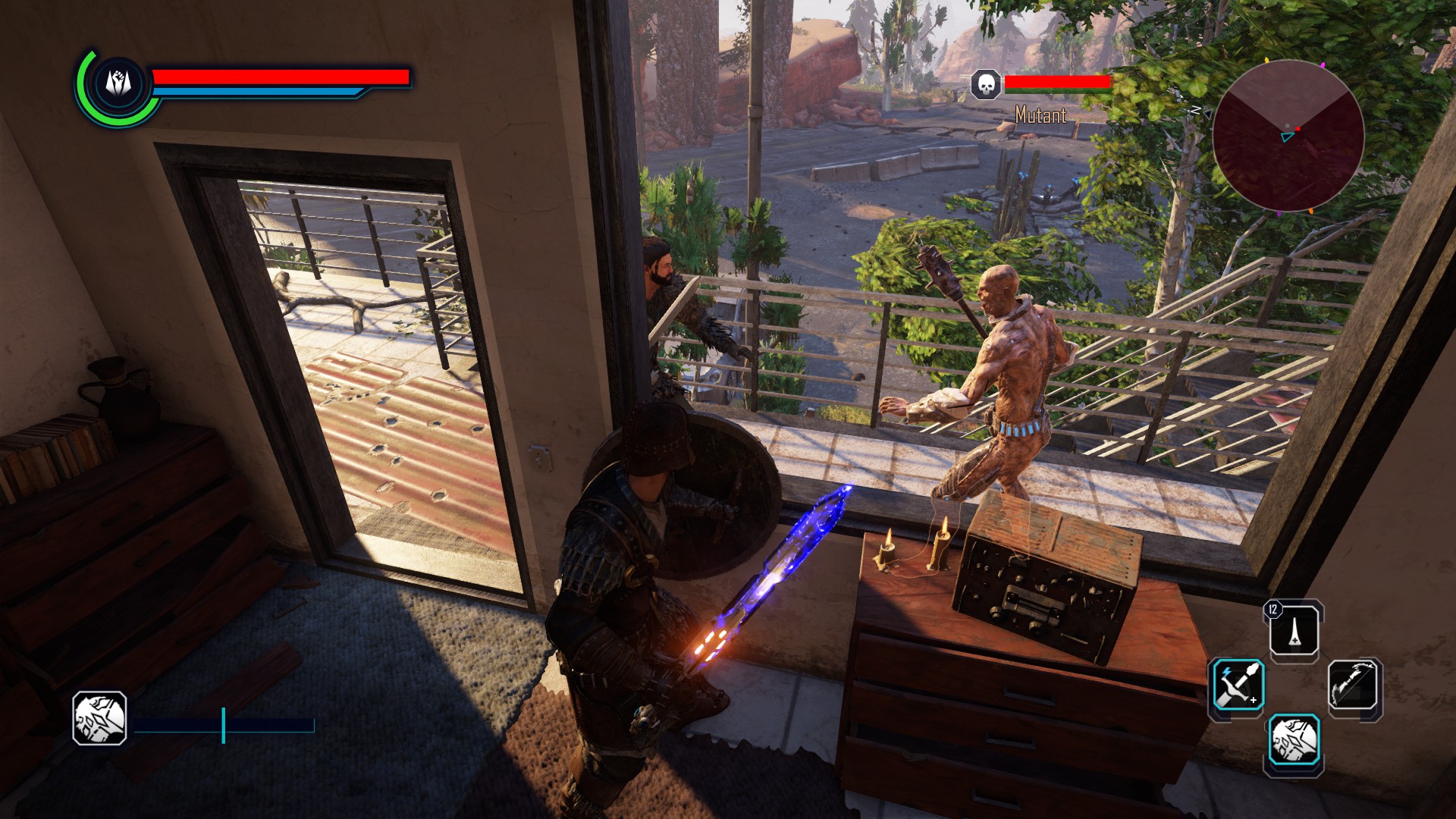
Though I adapted to its quirks, I will admit that the combat still feels slightly clunky. It’s reminiscent of Gothic in that it requires tricks and proper positioning to win, only I don’t like how poorly it’s explained and how counter-intuitive it is. Little missteps like the strong attack being more of an armor-piercing move rather than a damage move and the spamming weak attacks being the only real way to effectively combo is a bit of a downer. As I’ve described, it’s possible to navigate around that with tactics and trickery, but a new player expecting Skyrim, Dragon’s Dogma or Witcher 3’s smooth combat mechanics will be throwing their keyboards in frustration about 5 minutes into the main quest.
It also doesn’t help that every enemy – from simple mutant dogs to the giant cyclops – has a distance attack. Most of the common ground animals spit something at you if you dare try to fly away or stand somewhere they can’t get to. What’s worse is, like enemies with laser rifles and shotguns, the ranged attacks they fire at you never miss. It’s so bad I was standing directly behind a troll to get away from its one-hit-kill stone throwing attack, and as his arm animated to show a forward throw, the rock went BACKWARDS from his hand in what was the weirdest animation I’ve ever seen in a video game. Naturally, the rock throw was registered as a hit even though I was a good 50 feet away and on the opposite side.
Those heat-seeking stones were the only reason I’d think twice before fighting trolls.
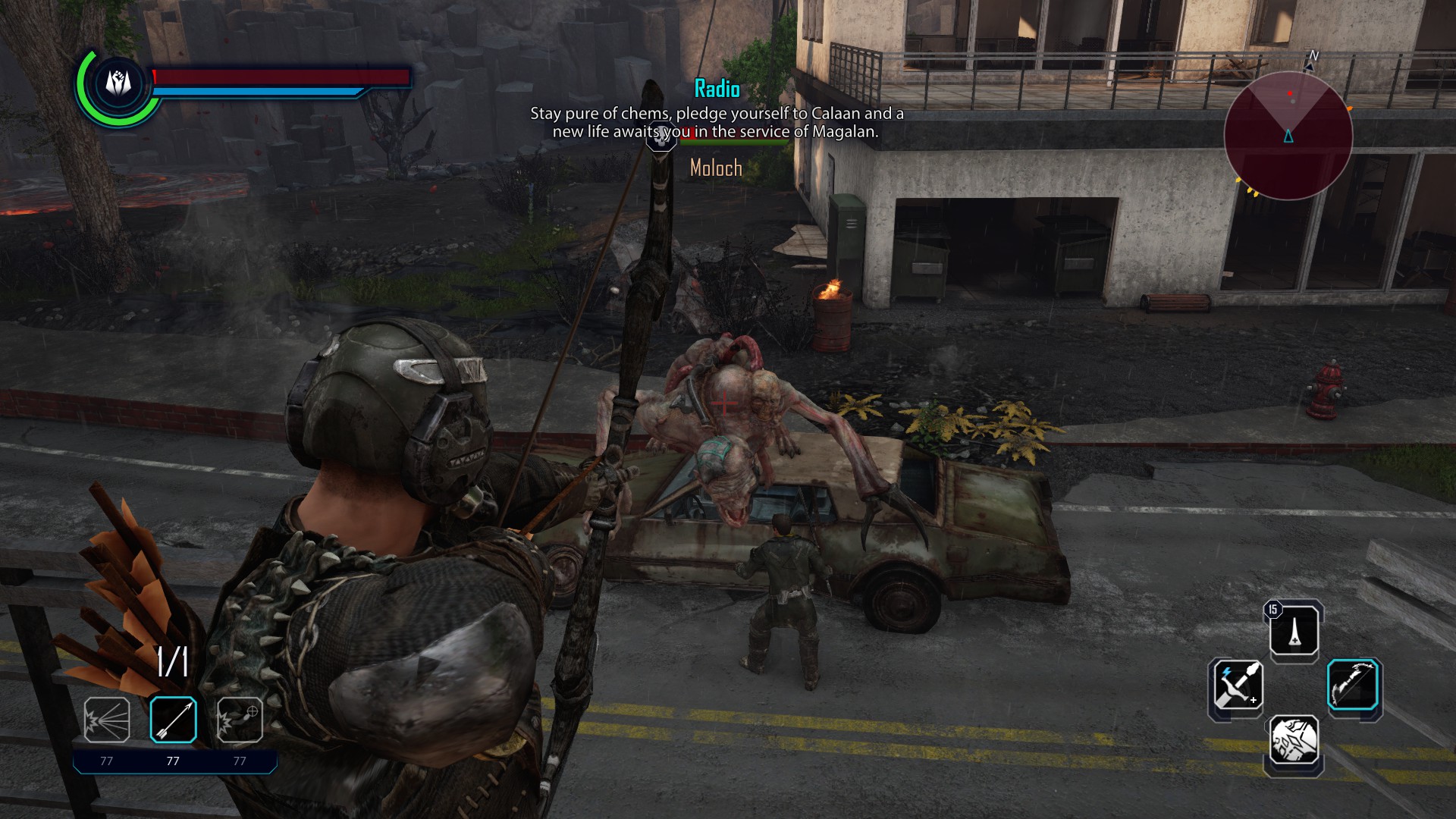
Also, partly related to the combat would be the unfathomably high stat requirements for equipment. Using a system similar to Gothic 2 Night of the Raven, stats cost significantly more attribute points to improve as you level them up. Once you hit 30 in a stat, increasing that stat by one point now costs two points. When you hit 60, it then becomes FIVE points just to raise it one. Since you will top out around level 40 by the end of the game and each level-up only nets you ten learning points, the only way you’ll hit the mid 80s in a statistic is to ignore two or more of your stats and dump everything in the one you want that high.
Since just about every “end game” skill and item costs around 75-85 in a particular stat to equip, it’s impossible to hit that peak unless you’re okay with forever blocking out entire skill lines.
Want that two handed legendary sword you found that requires 85 strength? Better ignore cunning, intelligence, and dexterity then. Even though doing so means no stealth, no high level lockpicking/hacking, and no magic.
Want to upgrade your War Bow to level 3 and fill it with gem slots? Better devote yourself to getting dexterity and strength to 80 and ignoring everything else, which means you’ll miss out on armor-increasing abilities and most magics.
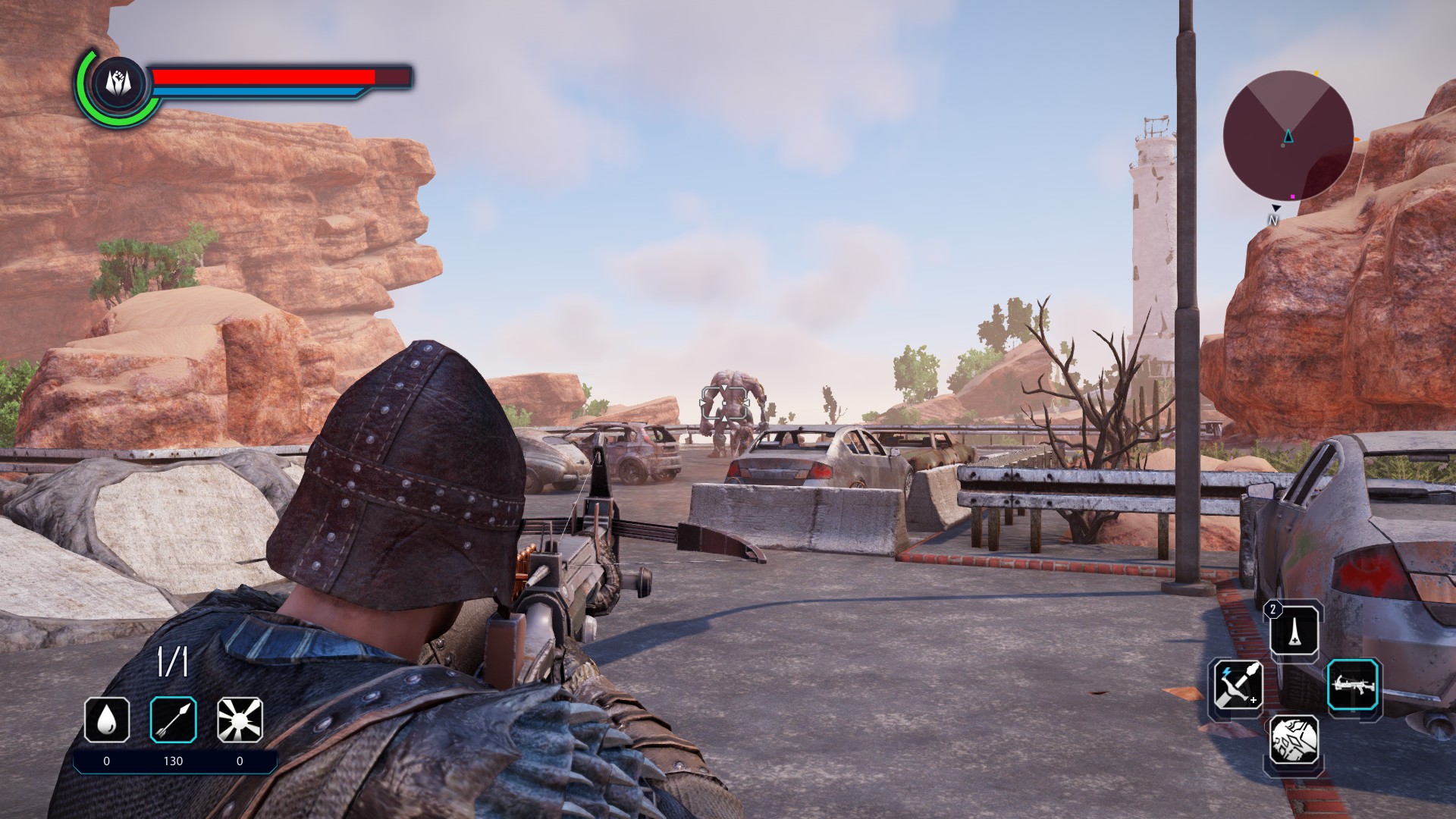
It’s a really weird forced style of min-max’ing that the game requires you to adhere to, and as much as I enjoy Elex and its Gothic-inspired awkwardness and imbalances, this is one thing that really grated on my nerves. Night of the Raven, the expansion to Gothic 2, did this…and I always downloaded an editor and changed the leveling table to remove the ever-increasing point requirement on statistics due to this. Call it cheating if you want, but I feel Elex could benefit from such an editor. It’s simply not possible to get any statistic above 70 unless you are willing to destroy your character’s karma by quaffing elex potions or employ the age old practice of the “dump stat”.
I did the former, and after drinking a couple hundred elex drinks, it still didn’t get me anywhere other than a ton of lost karma points. This forced me into creating a “jack of all trades” character, since relying on any single method of attack is essentially sentencing your hero to a quick and painful death.
Though the combat has its faults, one thing that Elex most certainly surpassed Gothic on is the atmosphere.
Post-apocalyptic games may be a dime a dozen, but most of them tend to get the idea of a blown-out wasteland confused with a Detroit ghetto. While broken down cars, torn up asphalt, and dilapidated store signs are all qualified and official indicators that your world is now populated by raider gangs, it’s become rather cliche and just seems lazy…especially when the aesthetic created by the first Fallout game is still being used without any deviation 20 years later.
Elex’s world does have plenty of destroyed buildings, upturned asphalt, and rusted out cars…but it also has jungles, wind-ravaged deserts, ice-covered cliffs, and volcanic regions coated in ash. It’s a very inhospitable land that varies in styles enough to where you don’t get bored of seeing the same models and textures repeated everywhere. Each area of the game world has its own flavor and style, with separate music, NPCs, and an entirely different mood and feel. It’s obvious that Piranha Bytes spent a lot of time making sure their new intellectual property would stand out amongst other post-apoc games.
Elex opens up in the game world’s jungle area, Edan. In this location, you find foliage pushing up through the streets, wrapping around buildings, and notice a sea of green slowly enveloping the formerly advanced technology of a long dead age. It’s very different from the feeling you first get stepping out of the Vault in any Fallout game or booting up the intro level of Borderlands. In Elex, the world is in different, confused stages of healing. That idea of different methods about recreating the world and the factions believing in those theories pushing up against each other is what drives the game’s story, and the visual side does an excellent job of supporting that narrative.
Oh yes, and just to juxtapose the natural world with the technological one, the game starts you off with a belt-mounted jetpack.
The Jetpack, which you get not long after you start, helps a lot more in navigating then it does in combat. Since the world is stacked very high in places, it’s almost mandatory that you use the jetpack to get by some of the earlier, tougher mobs that block the pathways to each town. It also helps you find out of the way, semi-hidden nooks and crannies that contain treasure or important NPCs. A huge part of the game’s fun comes from gliding around on the jetpack, climbing up mountain ridges looking for something interesting. With a few dozen unique legendary items (one hidden in a jetpack-only unreachable area in the domed city) spread around the world, curious gamers with lots of patience should have their diligence rewarded several times over by game’s end.
It may sound cliche, but in the end, it’s the little things that make Elex so spectacular. The way technophobe NPCs react to you using your built-in heads up display, the fact that important NPCs can die during missions and drastically change the story, the way you stumble into quests by accident (Like giving a bum some money and later finding out he’s the real boss of the town), the way the game remembers your choices and throws them back at you…Elex is far deeper than even Gothic 2, and while it falters in some aspects, the replayability is certainly not one of them.
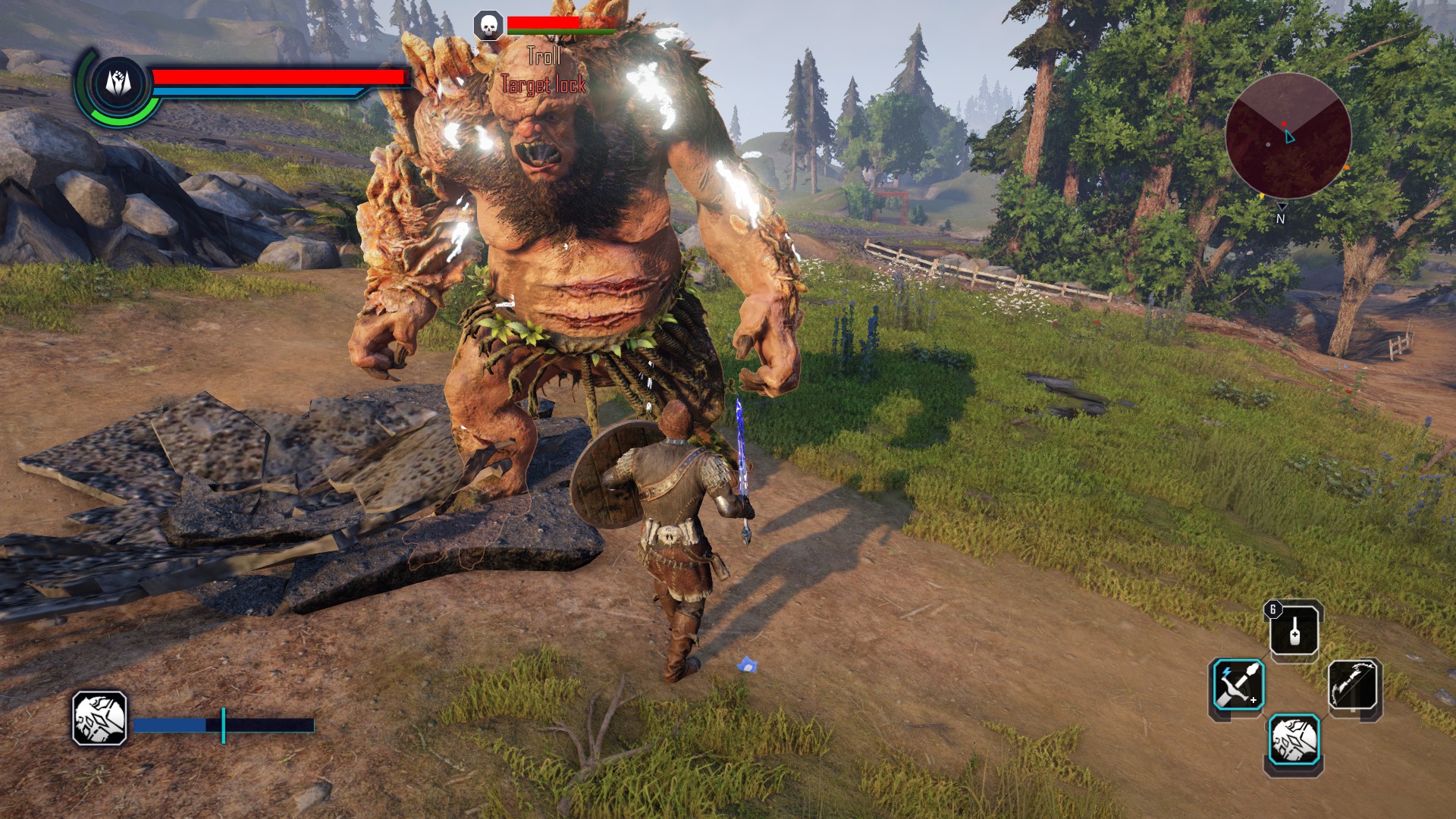
Even the NPC companions are done better this time around, with a few of them having some interesting quest lines that flesh out the game’s lore. There’s Ray, the dashing rogue that you’ll initially hate but grow to adore, there’s Arx the cold-hearted soldier, and even a cute hippie berserker sorceress that communes with nature and never wears shoes. Of course, if she’s not your type, there’s always the mouthy shaven-head punk chick that says the F-word once every sentence.
Though this game didn’t have the equivalent of a Diego (Old school Gothic fans know what I mean), the companions weren’t too terrible and were a step-up from what we were given in any of the Risen titles. I did enjoy how several of the optional companion quests tied in with the main story and revealed parts of the game’s lore that were otherwise never explained. It made doing those missions a priority, since they essentially acted as the real story and gave a purpose to the constant bickering between factions going on in the main quest line.
Elex is, when you break it down to its core parts, really nothing more than a re-skin of Gothic 2: Night of the Raven. The gameplay is the same, the slow progression is the same, the faction play is the same, and the story is not all that different either. The only difference is that you get a better and more open ending as well as a bigger world and much more non-linearity. If the idea of pulling up a chair and sitting in front of your keyboard for 80 hours playing a re-tread of Gothic 2 in post-apocalyptic wrapping appeals to you, then Elex will wow you the same way it did me.
With its only downsides being an awkward progression table and combat that comes with a steep learning curve, I was highly tempted to give Elex a 10. Though after comparing the game to the ultra-polished and masterfully balanced Witcher 3, I don’t feel comfortable putting it above CD Projekt’s masterpiece of CRPG design.
That being said, I still consider Elex one of the best CRPGs of this decade, and, if my 2nd trip through the game is as enjoyable as the first, it could be Piranha Bytes’ best game to date. As I’m playing through the game with the two factions I *didn’t* pick, I’ll be eagerly awaiting Elex 2.
Elex was reviewed on PC using a review copy purchased by Niche Gamer. You can find additional information about Niche Gamer’s review/ethics policy here.
The Verdict: 9
The Good:
- Amazing graphics
- Tons of choice & consequence
- Moderately non-linear and highly replayable
- large, well designed open world
- A fun twist on the cliched post-apocalyptic style
- Lots of tactics to employ in combat makes late game battles very enjoyable
The Bad:
- Spend the first half of the game relatively under-powered
- Combat can be awkward at times, requires lots of patience and practice



